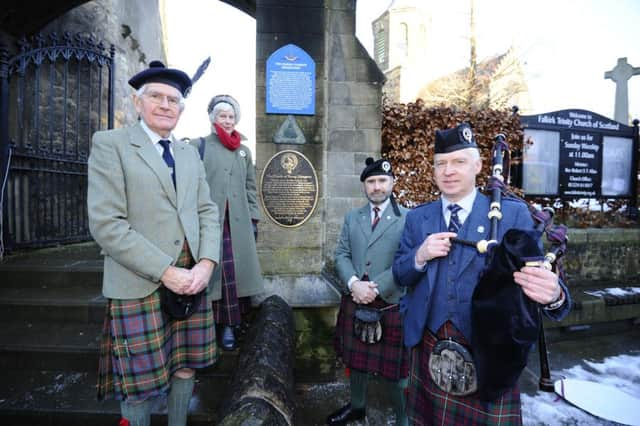Falkirk's tribute to a tragic young Jacobite paladin


The ceremony on High Street was to mark a 1746 Jacobite tragedy which until now has never been publicly marked in the High Street, where it happened.
Now, outside the Old Church, there is a plaque commemorating the death of the 20-year-old chieftain Young MacDonnell of Glengarry - killed the day after the Battle of Falkirk by an accidental shot from a clansman on his own side who was cleaning his musket.
Advertisement
Hide AdAdvertisement
Hide AdOn the previous day MacDonnell had led the 800-strong Glengarry regiment to victory against the Hanoverian army, in the largest battle of the Jacobite wars - also the Jacobites’ last victory.
This month’s ceremony at the Old Church saw Ranald MacDonnell, 23rd Chief of the MacDonnells of Glengarry, lay a wreath at his grave, which is within the tomb of medieval freedom fighter John de Graeme (who died in the 1298 Battle of Falkirk).
A short commemorative service was conducted by Rev. Canon Dr Robert Harley, Honorary Chaplain to The 1745 Association.
In a short but moving speech, Ranald MacDonnell told the gathering of the tragic effects the death had spelled both for the family and the wider Jacobite cause.
Advertisement
Hide AdAdvertisement
Hide AdThis was because the man responsible for the fatal accident was from Clanranald, and the Glengarry men had demanded his execution in reprisal - duly carried out by his own clan.
The incident and its aftermath cast a pall of gloom over the Jacobite army, and some argue it began the disintegration of Prince Charles Edward Stuart’s now faltering cause.
Ranald MacDonnell, accompanied by Lady MacDonnell, unveiled a plaque outside Falkirk Trinity Church to commemorate this incident from the town’s stormy past that few may have heard of until now.
Earlier Glen MacDonald of The 1745 Association had told the gathering in the church hall how the fatal shot had come to be fired - and how the mortally wounded Aeneas MacDonnell had vainly urged his men not to take any retribution against the culprit.